Understanding the Return Timeline of Background Checks

Introduction to Background Checks and Typical Timelines
Background checks are an essential part of many processes, including hiring, renting, and securing various forms of professional or financial services. They help verify an individual’s credentials, criminal history, employment history, and other critical personal information. In this first section, we will explore what a background check is, why it is performed, and the typical timelines for receiving results depending on the type of check.
What is a Background Check?
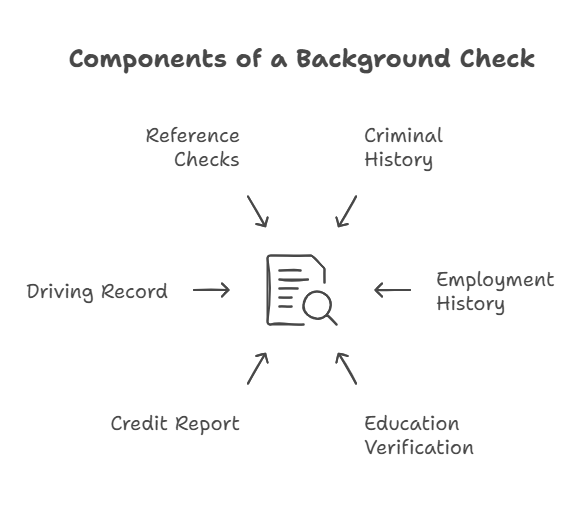
A background check is a process of investigating an individual’s personal history to confirm certain details and assess their suitability for a specific purpose. It involves gathering information from a variety of sources, including public records, criminal databases, and previous employers or educational institutions. Employers, landlords, financial institutions, and other organizations use background checks to make informed decisions based on the candidate’s history, reputation, and qualifications.
While the specific details of a background check may vary depending on the purpose, common factors checked include:
- Criminal history: Ensuring the individual has not been involved in criminal activities that may pose a risk to the employer, organization, or other parties.
- Employment history: Verifying past job positions, responsibilities, and length of employment.
- Education verification: Confirming the authenticity of educational credentials and degrees.
- Credit report: Reviewing an individual’s financial stability and responsibility (especially important in roles that involve handling money).
- Driving record: Checking if an individual has a history of traffic violations, especially important for jobs that involve driving.
- Reference checks: Speaking with individuals who have worked with or known the person to verify their character.
Why is a Background Check Performed?
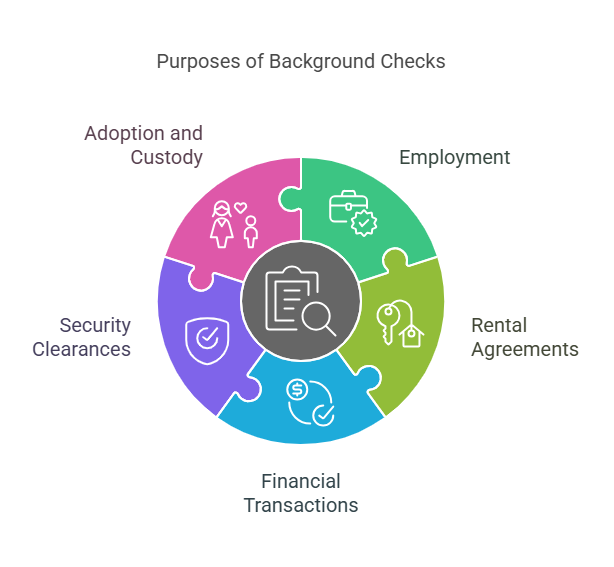
The reasons for conducting background checks are varied and depend on the context in which they are used. Below are some common scenarios in which background checks are essential:
- Employment: Employers conduct background checks to verify the qualifications and integrity of job candidates. This process helps to minimize hiring risks, reduce fraud, and ensure that individuals are fit for the role they are being considered for. It is especially critical in industries where employee conduct directly impacts safety, security, or reputation.
- Rental Agreements: Landlords often require background checks on potential tenants to assess their reliability and determine whether they can be trusted to pay rent on time, maintain the property, and comply with lease terms. Criminal history and credit reports are often key components in this process.
- Financial Transactions and Loans: Financial institutions, including banks and lenders, use background checks to evaluate an individual’s creditworthiness. This process involves checking credit scores, payment history, and any previous bankruptcies or defaults to assess the individual’s ability to repay loans.
- Security Clearances: In government and private sectors that deal with sensitive information or security matters, background checks help evaluate the trustworthiness of candidates who require security clearance.
- Adoption and Custody Situations: In adoption and child custody cases, background checks are conducted to assess the suitability of potential adoptive parents or guardians, ensuring the safety and well-being of the child.
Factors Affecting How Long It Takes to Get Background Check Results
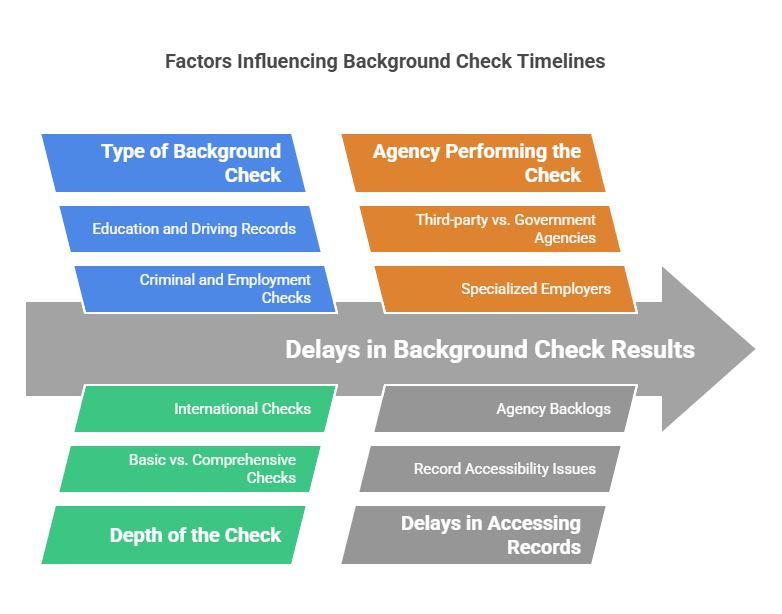
The timeline for receiving background check results can vary significantly based on several factors. Here are the most common factors that influence how long it takes for a background check to be completed and returned.
- Type of Background Check
- Criminal Background Check: This is one of the most commonly requested checks, and the timeline can vary. If it is a national check, it may take a few days as it searches broader databases. State-level checks may take longer if the state’s records system is slow or the search is more specific.
- Employment Verification: Employment checks usually take several days to a week, depending on the availability of information from previous employers. Some employers may respond quickly, while others may require additional time to provide detailed records.
- Credit Report: A credit check is typically faster than criminal background checks. It can be completed in just a few hours or a couple of days, depending on the method used and the specific credit reporting agency.
- Education Verification: Education verification may take longer than other checks, typically a few days to a week, especially if the educational institution is slow to respond or if there is a need to verify multiple degrees or qualifications.
- Driving Records: A driving record check can be completed relatively quickly, often within a day or two. However, it may take longer if the individual has lived in multiple states or has a complex driving history.
- Depth of the Check
Background checks come in varying depths of investigation. The more detailed the check, the longer it will take to process:- Basic Check: A basic background check usually involves a criminal history search and may take only a few days to complete.
- Comprehensive Check: A more thorough check that includes criminal history, credit history, education verification, employment verification, and more could take a week or longer.
- International Checks: If the person has lived or worked abroad, international background checks may be required. These checks can take longer due to language barriers, differing data systems, and the time it takes to verify international records.
- Agency Performing the Background Check
The agency conducting the background check can also impact the timeline. For example, third-party background check companies like Exact Background Checks tend to process results faster than government agencies or some specialized employers. Some agencies may also require additional time to verify details or request further information, which can add delays to the process. - Delays in Accessing Records
Sometimes, delays can occur if there is difficulty accessing the necessary records. This could be due to outdated or incomplete records, a lack of cooperation from previous employers or institutions, or issues with the accuracy of personal data provided. Background check agencies may also experience backlogs or delays due to high demand, especially during busy periods.
General Time Expectations for Various Types of Background Checks
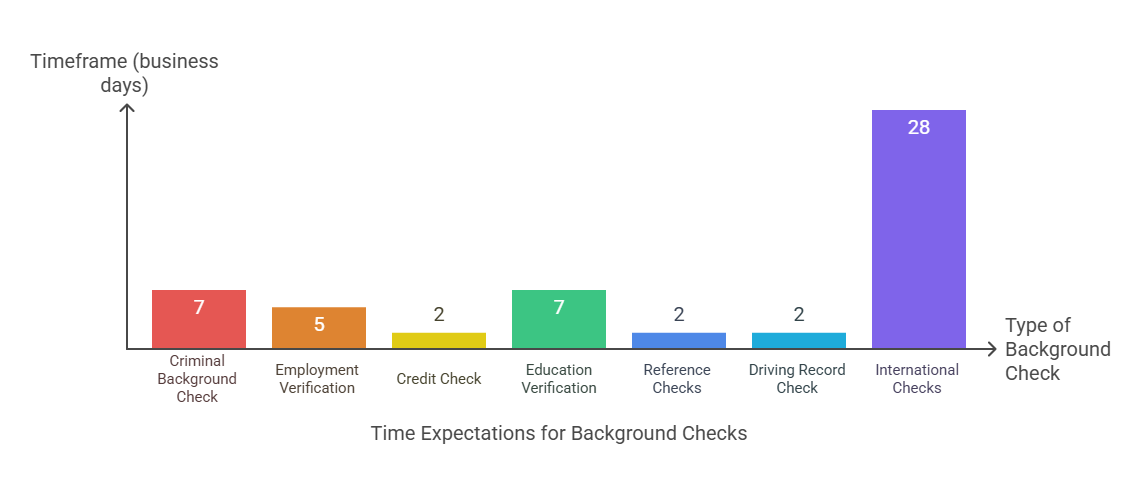
Here’s a general timeline for various types of background checks:
- Criminal Background Check: 1-7 business days (can take longer depending on the state or jurisdiction).
- Employment Verification: 1-5 business days (may take longer if contacting multiple employers or verifying a long work history).
- Credit Check: Typically 1-2 business days.
- Education Verification: 2-7 business days (longer if multiple institutions need to be contacted).
- Reference Checks: 1-2 business days.
- Driving Record Check: 1-2 business days.
- International Checks: 1-4 weeks, depending on the country and records.
These timeframes are general estimates, and factors such as record availability, verification processes, and the efficiency of the background check provider can influence the actual time it takes to complete the background check.
Factors Influencing Background Check Timelines and Services
While background checks are an essential part of many processes, including employment, renting, and financial services, the timeline for obtaining results can vary significantly based on a variety of factors. In this section, we will delve deeper into the specific elements that impact how long it takes to receive background check results. We will also discuss services that can help expedite the process, as well as how Exact Background Checks ensures accurate and timely results for businesses and individuals.
Factors Influencing the Timeline of Background Checks
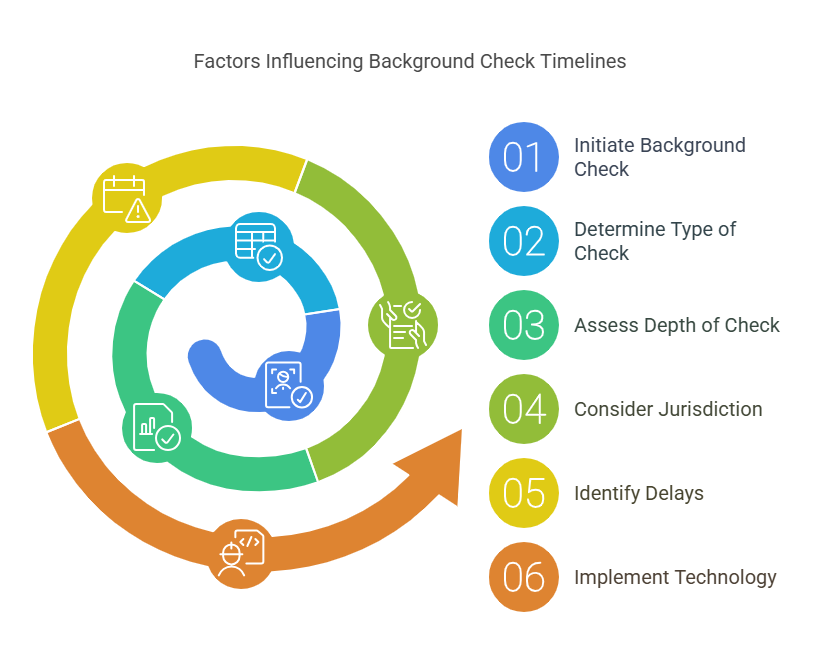
There are numerous factors that can either speed up or slow down the background check process. These include the type of check being conducted, the level of depth involved, the jurisdiction in which the records are located, and any potential delays in obtaining or verifying data. Below, we explore each of these factors in greater detail.
1. Type of Background Check
The type of background check being performed is one of the most significant factors affecting the timeline. Different checks require varying amounts of information, sources, and verification steps. Here’s a breakdown of common background checks and their impact on the overall timeline:
- Criminal Background Check: A criminal background check involves searching databases of criminal records to determine whether a person has been involved in any criminal activity. If the search is limited to local or state databases, it can be completed relatively quickly, usually in 1 to 3 days. However, if the check involves a broader search, such as a national criminal database or international checks, the process can take up to a week or longer. In some cases, delays may occur if records are outdated or incomplete.
- Employment Verification: Employment checks are usually time-consuming, as they require contacting previous employers to verify dates of employment, job titles, and other work-related details. Depending on how quickly the previous employers respond, this process could take anywhere from 3 days to a week. If multiple employers need to be contacted or if the work history spans many years, additional time may be needed to verify all details.
- Education Verification: Verifying an individual’s educational background is another time-intensive process. Educational institutions are often slow to respond to verification requests, especially if the individual attended several schools or earned multiple degrees. This process can take anywhere from 3 to 7 days, with longer delays possible if the school is unresponsive or difficult to contact.
- Credit Report Check: A credit check is typically quicker than other types of checks, as it involves pulling information from a credit reporting agency’s database. This process can take just a few hours to a day. However, delays can occur if there are issues with the applicant’s credit history, such as a need for further clarification on discrepancies or the presence of fraud alerts.
- Drug Testing: If drug testing is part of the background check process, the type of test will influence the timeline. For example, a urine test usually yields results in 24 to 48 hours, while a hair follicle test or blood test may take a few days longer due to the need for lab processing. Delays can occur if the sample is flagged for further testing or if the laboratory experiences a backlog.
2. Depth of the Background Check
The depth of the background check directly impacts how long it will take to gather all necessary information. A standard background check, which may include only a criminal record search, may take only a few days. However, a more comprehensive background check that includes employment verification, education history, credit checks, and reference checks will naturally take longer. The more sources that need to be contacted and verified, the longer the process will take.
For example, a basic criminal check may involve a national or state database search, which can be completed quickly. On the other hand, a comprehensive check may include criminal records at the county level, employment history from several years, education verification from multiple institutions, and credit history checks, all of which can take several days or even weeks.
3. Jurisdiction and Location of Records
Where the records are located can significantly affect the timeline. For example, some states or local jurisdictions have more efficient record-keeping systems than others. A background check that only involves records from a specific state or city may be faster to process than one that requires information from a variety of states, or international records, which could be harder to obtain.
- State vs. National Checks: A background check conducted at the state level is typically quicker than a national or federal background check. National databases may take longer to search because they often include a larger amount of information. A state or local check is more streamlined, but it may not provide as complete a picture of an individual’s history.
- International Background Checks: When conducting background checks on individuals who have lived abroad or have international work experience, the timeline can extend significantly. International checks often require contacting foreign authorities or institutions, and differences in language, record-keeping practices, and time zones can add to the delay. Some countries may also have restrictions on sharing criminal records or other personal information, which can further extend the process.
4. Delays in Accessing or Verifying Records
In some cases, delays occur simply because it takes time to access the necessary records. This can happen for several reasons:
- Incomplete or Inaccurate Information: If the candidate provides inaccurate or incomplete information, such as a misspelled name, incorrect date of birth, or a previous address that does not match the records, the background check process may be delayed. Investigators will need to follow up with the candidate or additional sources to clarify or correct the discrepancies.
- Slow Response from Employers or Educational Institutions: Verification of employment or education history often requires contacting third parties such as employers, academic institutions, or government agencies. These organizations may be slow to respond, especially if they are overwhelmed with requests or if their systems are not updated.
- Backlogs at Background Check Agencies: Some background check companies or government agencies may experience backlogs, especially during busy hiring seasons or when there is a surge in background check requests. This can slow down the entire process.
5. Use of Technology and Automation
The technology and automation used by background check agencies can have a significant impact on the speed of the process. Some companies, like Exact Background Checks, have invested in automation tools and sophisticated software to streamline the verification process. Automated systems can search databases faster, send verification requests to employers or institutions more efficiently, and flag discrepancies more quickly.
The use of electronic records can also speed up the process. If an organization uses an online database of employee records or education certifications, the process may be quicker. However, in cases where records are kept in paper form or are scattered across different databases, the process can be slower.
Exact Background Checks: Ensuring Timely and Accurate Results
One company that has honed its ability to provide timely and accurate background checks is Exact Background Checks. The company specializes in offering comprehensive background check services for businesses and individuals, ensuring a smooth and quick screening process.
Exact Background Checks works with a network of trusted sources to verify criminal history, employment, education, credit, and more. Their proprietary systems allow for faster processing by utilizing both automated technology and human verification. They are committed to reducing delays by ensuring that every step of the process is handled efficiently.
How Exact Background Checks Expedites the Process:
- Access to a Vast Network of Databases: With access to national and international databases, Exact Background Checks can quickly pull data from multiple sources, speeding up the overall process.
- Efficient Communication with Employers and Educational Institutions: Exact Background Checks has established relationships with many employers and schools, allowing them to expedite verification requests.
- Automated Data Collection: By using advanced automation tools, Exact Background Checks is able to retrieve information from various sources and compile it in record time.
- Experienced Team: A team of professionals is available to follow up on any issues or delays, ensuring that all records are accurately and quickly verified.
How to Expedite the Background Check Process
While the factors influencing the timeline are often beyond your control, there are several strategies you can implement to speed up the process:
- Provide Accurate and Complete Information: Ensure that all personal details, addresses, and other pertinent information are accurate and up-to-date. This reduces the need for follow-up inquiries.
- Give Consent Quickly: Background checks often require written consent from the individual. Responding to consent requests quickly can help initiate the process without unnecessary delays.
- Use a Reliable Background Check Service: Partnering with a reputable and efficient service like Exact Background Checks ensures a smooth and timely process. A reliable service provider can help identify potential bottlenecks and address them quickly.
- Follow Up with Third Parties: If you are conducting employment or education verifications, stay in touch with the relevant parties to ensure that they are responding to requests in a timely manner.



